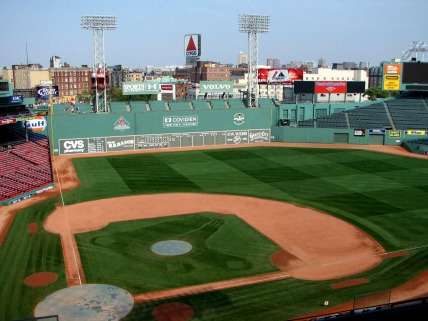Are Racist Remarks Illegal in Massachusetts?
A Red Sox fan's bigoted comment about a singer's rendition of the national anthem prompts a police investigation.

On Tuesday a Red Sox fan who used a racial epithet to disparage the singer who performed the national anthem was expelled from Fenway Park. The next day, he was banished from the stadium for life.
The Red Sox, who are trying to improve the atmosphere at a stadium known for bigoted taunts, are well within their rights to make and enforce rules for audience behavior. Much more questionable was the reaction to the incident from the Boston Police Department, which said "the BPD's Civil Rights Unit is investigating the allegations and will make a determination as to whether further action is warranted."
What sort of action, you might wonder, in response to what potential crime? The Washington Post says the expelled fan was reported by Calvin Hennick, a white man who came to the game with his son and his father-in-law, who is black. According to Hennick, the man who was ejected complained to him that the singer, who is from Kenya, had "niggered up" The Star-Spangled Banner. Hennick informed an usher, who notified stadium security.
It is not hard to understand why Hennick took offense at the comment, but it is hard to understand why the police thought a criminal investigation was appropriate. The BPD's Civil Rights Unit investigates "hate crimes," where the perpetrator selects his victim based on the latter's perceived or actual membership in a protected group, such as a racial minority. But in this case, the obnoxious fan did not target Hennick based on Hennick's race, and in any event there was no underlying crime.
The Massachusetts Civil Rights Act authorizes civil action against "bias-motivated threats, intimidation, and coercion" that interfere with people's civil rights. But Hennick's account does not suggest that the banished fan's actions qualified for that description. Here is how the Massachusetts Attorney General's Office (AGO) defines the key terms:
A "threat" occurs when the perpetrator does or says things with the intent to make another person fearful or apprehensive of injury or harm. "Intimidation" occurs when the perpetrator intentionally puts another person in fear for the purpose of compelling or deterring conduct by that person. "Coercion" occurs when the perpetrator uses force, either physical or moral, to compel another person to do something against his/her will that he/she would not otherwise have done.
None of those things happened in this case. The AGO emphasizes that "hateful and offensive speech or symbols, standing alone, do not necessarily violate the law." That necessarily should give civil libertarians pause, since it suggests that hateful speech could be against the law, which would be a clear violation of the First Amendment. There is a similar problem with a police investigation prompted by a racist remark at a baseball stadium, even if it does not result in any charges. I have asked the BPD to clarify how the incident at Fenway could possibly justify "further action" by the police and will update this post if and when I receive a reply.
[Thanks to Hans Bader for the tip.]
